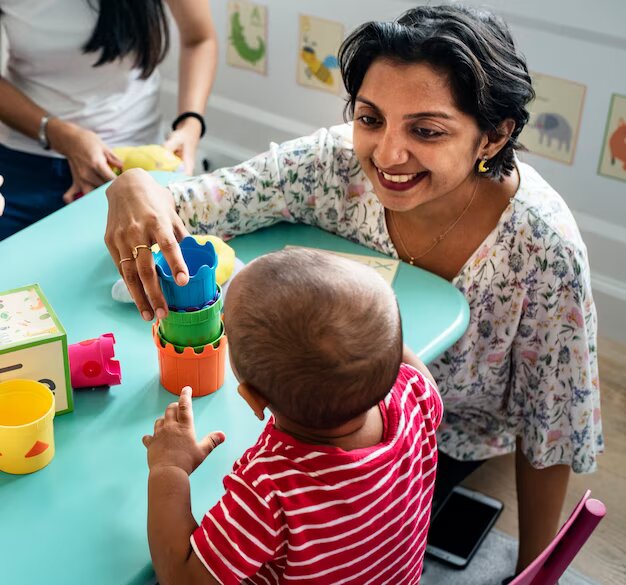As parents, we’re always looking for methods to encourage the mental growth of our kids for baby classes. The brain experiences extraordinary development and learning processes from birth through early childhood. This article will discuss the idea of brain training for kids and the advantages of enrolling in educational infant programmes. Understanding these practices may support your child’s future growth, encourage learning, and lay a strong foundation.
Kids’ Brain Training:
Cognitive Stimulation: Children’s brain training for kids exercises and games are designed specifically to improve cognitive functions like memory, focus, problem-solving, and linguistic skills. The goal of these workouts is to strengthen neural connections and the brain’s capacity for information processing and learning.
Self-Adaptation: The brain has a remarkable capacity for self-adaptation and rewiring in response to experiences and educational opportunities. Exercises for the brain that tap into this neuroplasticity help the brain become more flexible and effective overall by promoting the growth of new neural connections.
Enhancement of Skills: Participating in brain training exercises will help you develop certain abilities required for academic achievement. Puzzles, memory exercises, tests of logical thinking, and interactive educational applications may be included in these activities. These brain teasers help kids develop their analytical, problem-solving, and critical thinking skills by regularly taxing their brains.
Memory Span Advancement: Improvements in memory and attention span, which are essential for efficient learning and information retention, are a common target of brain training exercises. Memory games, concentration drills, and ways to improve attention and concentration might all be included in these activities. Children can improve their capacity for prolonged attention and better memory recall by exercising these cognitive processes.
The goal of brain training and educational baby classes is to advance children’s cognitive growth from an early age. These classes aim to provide stimulating and engaging activities that promote brain growth and intellectual skills. Here are some key aspects of these classes and their potential benefits:
Baby enrichment classes:
Early Stimulation: Enriching baby programmes give babies and toddlers a caring and stimulating atmosphere. These programs contain age-appropriate activities that promote sensory exploration, motor skill development, social interaction, and cognitive development. Neural connections are made and general brain development is aided by exposing infants to a variety of fascinating environments.
Language Development: Through exercises like singing, reading, and interactive storytelling, baby programmes frequently place an emphasis on language development. Vocabulary learning, language comprehension, and communication abilities are all improved by exposure to a rich linguistic environment. These language-developmental exercises establish the groundwork for youngsters to develop excellent language skills as they get older.
Social and Emotional Development: Enriching infant courses provide chances for contact with peers and carers, supporting the growth of social and emotional abilities. Children learn to negotiate social circumstances, express their feelings, and cultivate empathy and collaboration via group play, sharing activities, and supervised interactions.
Sensory Stimulation: A significant part of many infant programmes is sensory exploration. Babies’ sensory processing skills grow when they interact with a variety of textures, noises, colors, and movements. These encounters pique the brain’s interest and set the foundation for sensory integration, which is essential for the growth of the mind, body, and emotions.
The advantages of enriching classes for babies and brain training include the following:
Improved Cognitive Abilities: Participating in engaging baby classes and brain-training exercises can improve cognitive abilities. Children that do brain exercises may show enhanced memory, focus, problem-solving, and language abilities, which will boost their scholastic achievement and intellectual development.
Early Learning Foundation: Taking part in educational infant programmes lays a solid groundwork for lifetime learning. By introducing infants to engaging environments and activities from an early age, we can foster their interest in and love of learning. This creates the foundation for a positive outlook on education and a hunger for information as they move through childhood and beyond.
Engagement: Enriching infant programmes provide children the chance to engage with others and develop their emotions. Children gain social skills, empathy, and emotional control via controlled interactions with peers and carers. These abilities support positive interpersonal interactions and general well-being.
Parent-Child Bonding: Attending infant courses and brain training activities helps parents and kids form a close link. Sharing experiences, providing supportive feedback, and spending quality time together are all made possible by participating in these activities together. The connection made in these formative years serves as the basis for a loving and caring parent-child relationship.
Brain training and enriching baby classes have gained popularity as parents seek effective ways to support their children’s cognitive and developmental growth from a very young age. These classes offer a range of activities designed to stimulate different aspects of a child’s brain, fostering early learning and overall development. Here are some insights into the benefits and considerations of brain training and enriching baby classes:
Benefits:
- Early Stimulation: Brain training classes expose babies to various stimuli that can enhance neural connections and brain development during critical periods of growth.
- Sensory Exploration: Enriching baby classes often incorporate sensory activities that engage a child’s senses, promoting sensory integration and cognitive development.
- Social Interaction: Group classes provide babies with opportunities to interact with their peers, fostering social skills and emotional development.
- Language Acquisition: Many classes incorporate songs, rhymes, and interactive activities that can contribute to early language acquisition and communication skills.
- Motor Skills: Activities that involve movement and manipulation of objects can enhance fine and gross motor skills.
- Parent-Child Bonding: Attending these classes together can strengthen the bond between parents and babies through shared experiences and interactions.
- Structured Learning: Even at a young age, structured activities can introduce babies to routines. The foundational concepts, setting the stage for future learning.
Conclusion:
Children’s brain growth can be supported and learning can be boosted through brain training for infants and participation in interesting infant courses. You may develop your social and emotional intelligence. These activities offer kids a safe space to learn, explore, and lay the groundwork for their future success. Parents may actively support their child’s total cognitive, emotional, and social well-being by adopting these practices, putting them on a road to lifetime learning and fulfillment.
Read More – https://urweb.eu/



